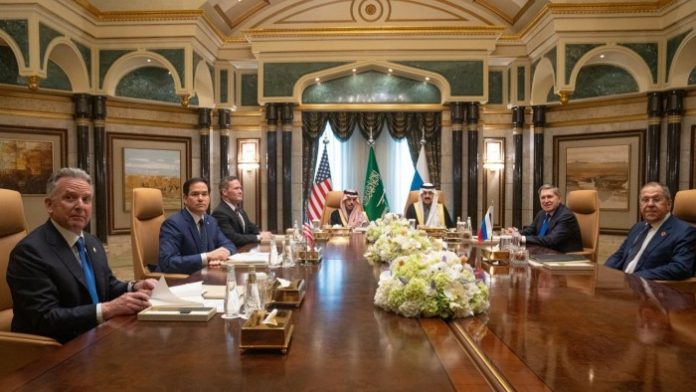Unlock the White House Watch newsletter for free
Your guide to what the 2024 US election means for Washington and the world
Russia and the US have agreed to “lay the groundwork for future co-operation” on bolstering ties and ending the Ukraine war, after holding the first high-level talks on the conflict since the early months of Vladimir Putin’s invasion.
Following four-and-a-half hours of negotiations in Riyadh on Tuesday, the US state department said the two sides would appoint “high-level teams” to seek to end the war and establish a diplomatic channel to resolve bilateral issues.
“This needs to be a permanent end to the war and not a temporary end as we’ve seen in the past,” said US national security adviser Mike Waltz, who accompanied secretary of state Marco Rubio and Donald Trump’s special envoy Steve Witkoff at the talks.
“The practical reality is that there’s going to be some discussion of territory and there’s going to be discussion of security guarantees, those are just fundamental basics,” Waltz added, noting that Trump was “determined to move very quickly”.
The Riyadh talks have sparked fears in Kyiv and in European capitals that Trump wants to settle the conflict on Putin’s terms and on Tuesday the Kremlin appeared to harden its position.
The state department said that the new diplomatic channel would “lay the groundwork for future co-operation on matters of mutual geopolitical interest and historic economic and investment opportunities which will emerge from a successful end to the conflict in Ukraine”.
Russia said the two sides would also appoint separate delegations to discuss Ukraine.
Asked what concessions Moscow would make, Rubio said any such step would result from “hard, difficult diplomacy” in “closed rooms over a period of time”.
He added: “No one is being sidelined here.”
Witkoff said the EU was “going to have to be at the table at some point because they have sanctions as well that have been imposed”.
But on Tuesday, the Russian foreign ministry ruled out a role for Europe in Ukraine talks and demanded Nato rescind an open-ended 2008 invitation to Kyiv, as it said Moscow was “categorically opposed” to a European peacekeeping deployment.
European leaders had previously clashed at a Paris summit over dispatching peacekeeping forces to Ukraine. While the UK offered to put “boots on the ground”, Germany, Italy, Poland and Spain expressed reluctance to do so.
Waltz said the US was conducting “shuttle diplomacy” and had consulted Ukrainian President Volodymyr Zelenskyy and French President Emmanuel Macron, while Trump will meet UK Prime Minister Keir Starmer next week.
He added that he rejected the “notion that our allies haven’t been consulted”.
Tuesday’s meeting in Riyadh was the first of its kind between the US and Russia since Moscow’s 2022 invasion of Ukraine. In a sight almost unthinkable even a few weeks ago, Russian and American flags flew next to each other outside the opulent palace where the meeting took place.
The talks marked an extraordinary turnaround in just a matter of days after Trump called Putin last week in an effort to end the war — without consulting Ukraine or its European allies.
Kyiv has said it will reject any deal imposed on it without its involvement, while European countries have been left scrambling to claw back a seat at the table.
As Tuesday’s talks took place, Zelenskyy visited his Turkish counterpart Recep Tayyip Erdoğan, who has previously sought to play a brokering role in the conflict.
Yuri Ushakov, Putin’s foreign policy adviser, who accompanied Russian foreign minister Sergei Lavrov in the Riyadh talks, said the discussions were “not bad”. He added that Russia and the US had “agreed to take each others’ interests into account”, but it was “hard to say” they were “growing closer”.
Ushakov said that the US and Russia would work to “create the conditions” for a Trump-Putin meeting, though he said it would probably not take place next week, since “thorough work” was needed first.
The US appeared to have given into some of Putin’s core demands before the talks even began after saying Ukraine’s ambitions to join Nato and reclaim territory currently occupied by Russia were not “realistic”.




